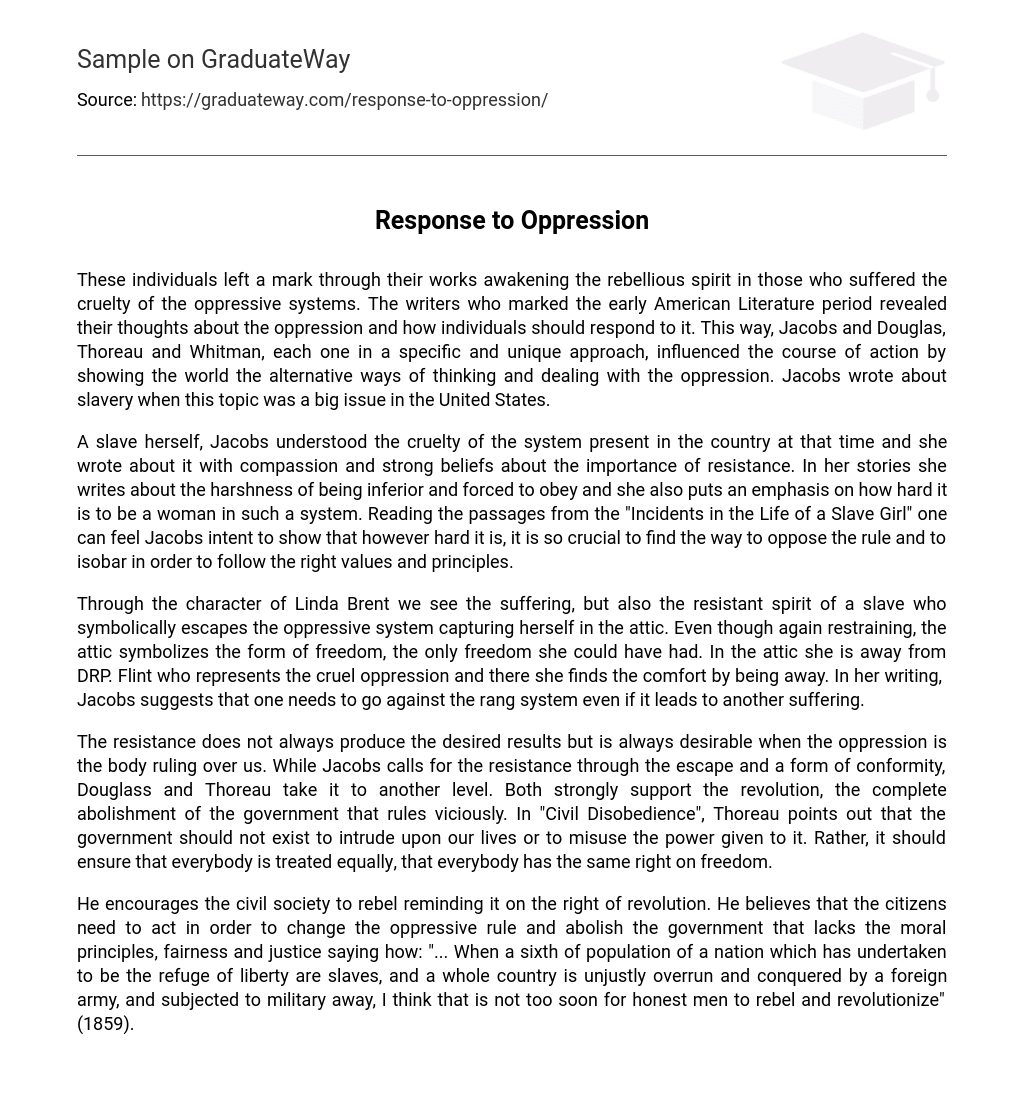These individuals left a mark through their works awakening the rebellious spirit in those who suffered the cruelty of the oppressive systems. The writers who marked the early American Literature period revealed their thoughts about the oppression and how individuals should respond to it. This way, Jacobs and Douglas, Thoreau and Whitman, each one in a specific and unique approach, influenced the course of action by showing the world the alternative ways of thinking and dealing with the oppression. Jacobs wrote about slavery when this topic was a big issue in the United States.
A slave herself, Jacobs understood the cruelty of the system present in the country at that time and she wrote about it with compassion and strong beliefs about the importance of resistance. In her stories she writes about the harshness of being inferior and forced to obey and she also puts an emphasis on how hard it is to be a woman in such a system. Reading the passages from the “Incidents in the Life of a Slave Girl” one can feel Jacobs intent to show that however hard it is, it is so crucial to find the way to oppose the rule and to isobar in order to follow the right values and principles.
Through the character of Linda Brent we see the suffering, but also the resistant spirit of a slave who symbolically escapes the oppressive system capturing herself in the attic. Even though again restraining, the attic symbolizes the form of freedom, the only freedom she could have had. In the attic she is away from DRP. Flint who represents the cruel oppression and there she finds the comfort by being away. In her writing, Jacobs suggests that one needs to go against the rang system even if it leads to another suffering.
The resistance does not always produce the desired results but is always desirable when the oppression is the body ruling over us. While Jacobs calls for the resistance through the escape and a form of conformity, Douglass and Thoreau take it to another level. Both strongly support the revolution, the complete abolishment of the government that rules viciously. In “Civil Disobedience”, Thoreau points out that the government should not exist to intrude upon our lives or to misuse the power given to it. Rather, it should ensure that everybody is treated equally, that everybody has the same right on freedom.
He encourages the civil society to rebel reminding it on the right of revolution. He believes that the citizens need to act in order to change the oppressive rule and abolish the government that lacks the moral principles, fairness and justice saying how: “… When a sixth of population of a nation which has undertaken to be the refuge of liberty are slaves, and a whole country is unjustly overrun and conquered by a foreign army, and subjected to military away, I think that is not too soon for honest men to rebel and revolutionize” (1859).
Douglass similarly suggests and encourages the rebellion In “The Heroic Slave”. He shows the world that the opposition is important and can bring the prominent results. The slaves in the story fought for their freedom and their escape symbolizes the importance and effectiveness of being actively engaged in fight for freedom and a fair treatment. Even though Douglass, Thoreau and Jacobs do not entirely agree on the ways the oppression should be dealt with, all three suggest that it should be opposed as every other negative force should be.
In her poem 320, Dickinson seems to rather see the oppression as a positive intrusion into people’s life teaching us what we cannot learn any other way. She seems to suggest that we need to embrace the oppression as it gives us “Heavenly Hurt” while not leaving any scars. Dickinson compares the oppression with a “Slant of light’ (2567) and “the Heft Of Cathedral Tunes” (2567). This way she implies that even though it might put some ‘Weight” on us, the oppression is uplifting DOD for us.
From the first stance due to the comparison with the “Heft of Cathedral Tunes” (2567) we could assume that Dickinson is talking about the religion, the divine ruler being a form of oppression that we need to obey to, that is so important and powerful that ‘Wine it comes, the Landscape listens” (2567) and “shadows-hold their breath” (2567). Dickinson perception of oppression and her view that the individual should embrace it rather than oppose and fight against is evidently different from the views and positions of he other three writers who strongly reject the embracement of any kind of oppression.
We can conclude that individuals see the same things differently and respond to them in many different ways. Douglass, Dickinson, Jacobs and Thoreau all recognized the need and the importance of writing about the oppression, but each one of them had a somewhat unique approach to what the oppression means and what the individual responses to it should be. Some are strongly supporting the rebellious response while some believe that certain forms of oppression teach us things we can learn in no other way.





